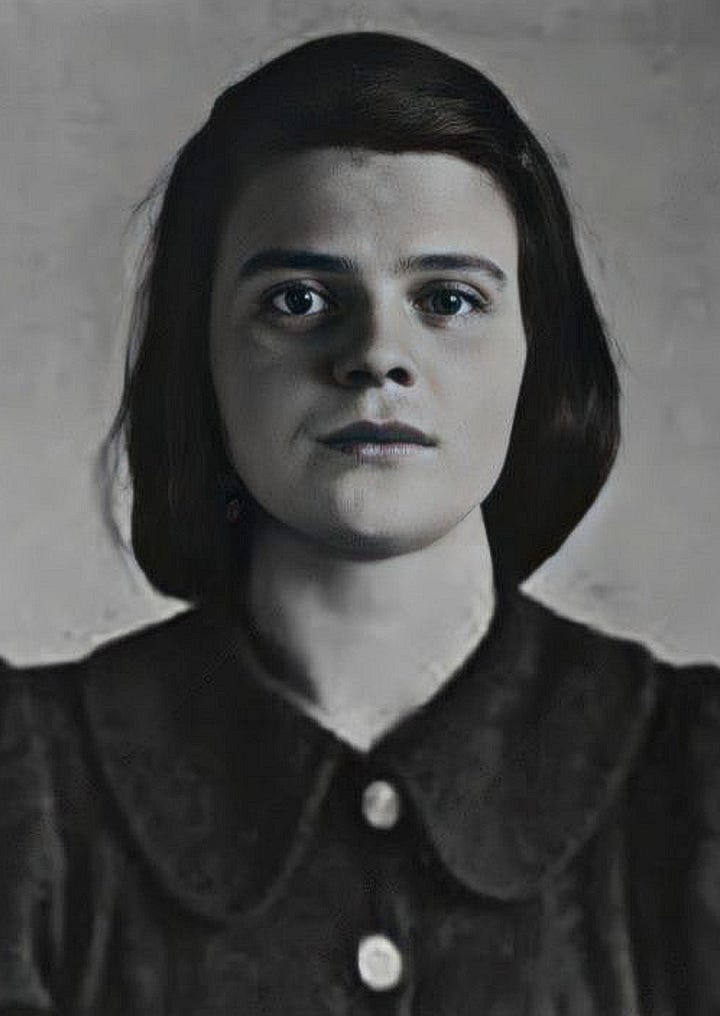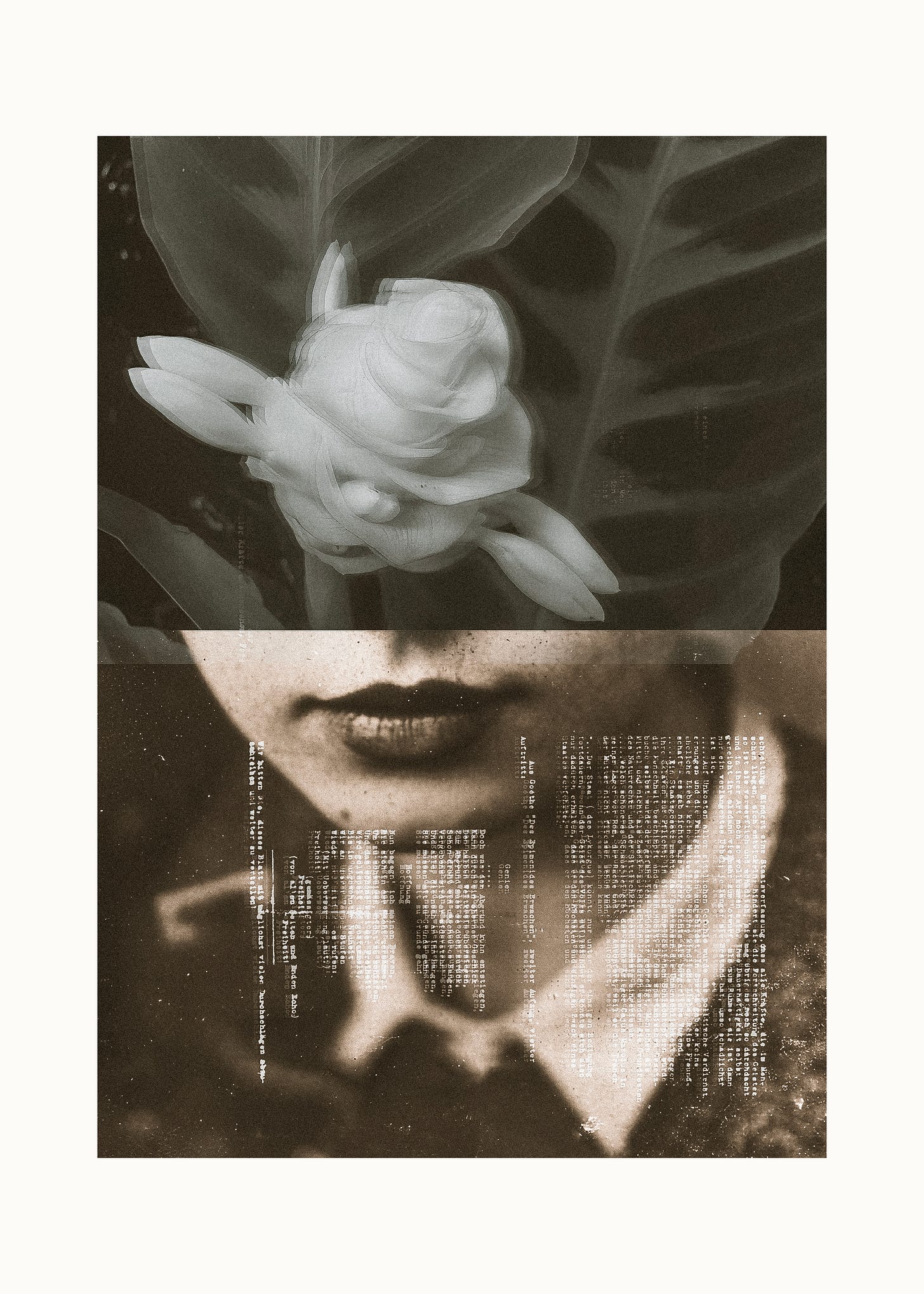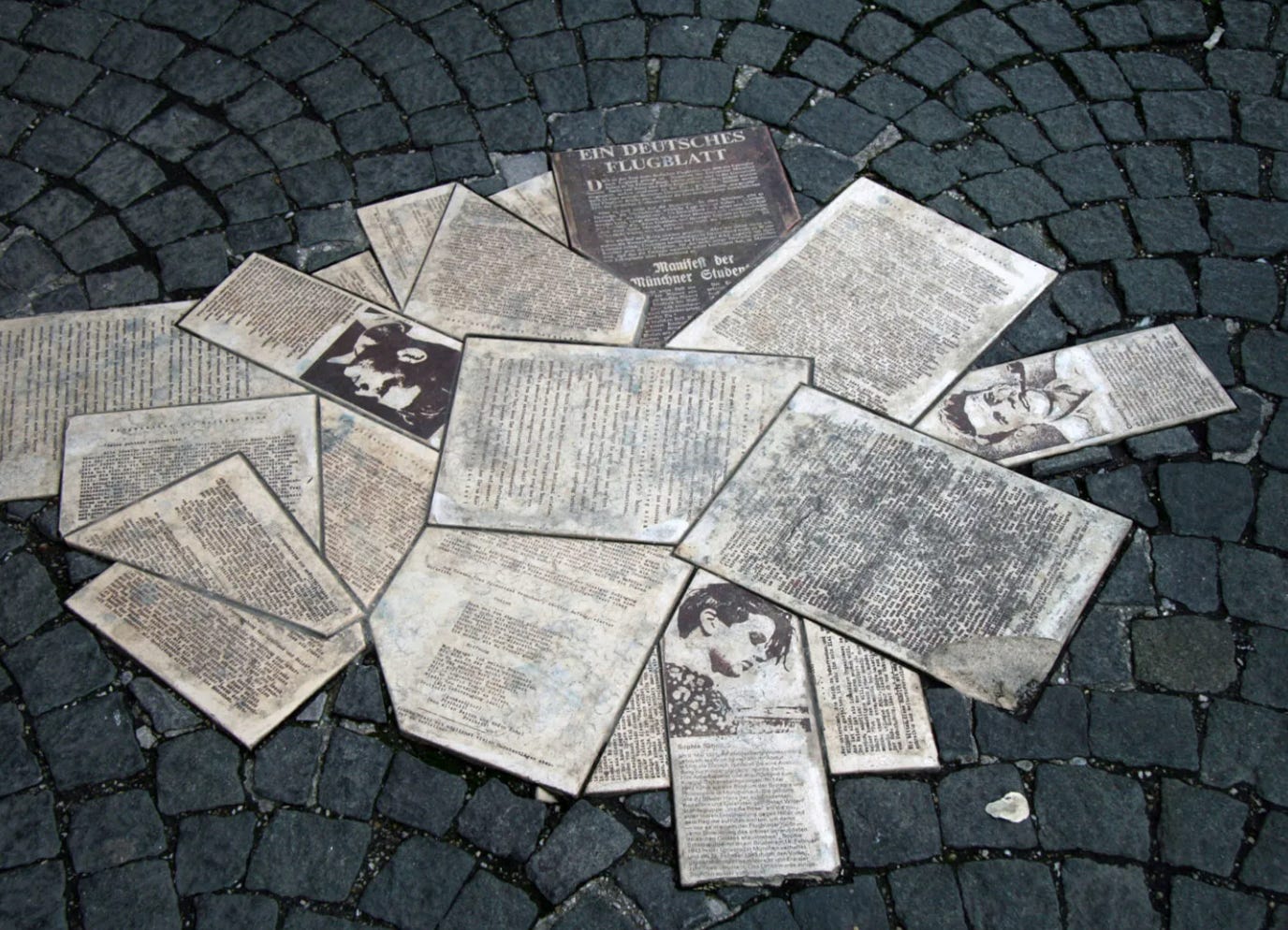You can listen to my unedited reading of this essay and probably hear my German accent more than usual.
“Isn't it a riddle . . . and awe-inspiring, that everything is so beautiful? Despite the horror.”
Sophie Scholl
When I was growing up in Germany, school was not something I ever looked forward to. I have some fond memories from high school as I had some good friends and a few nice teachers who believed in me, but overall my school years were mostly defined by feeling sick to my stomach every morning. Several of my teachers were quite strict and somehow paid a lot of attention to shy girls like me who preferred to stay quiet and wished they were invisible. I remember feeling particularly nervous before every history class in 9th grade, although all of us, even the confident and outgoing students, felt quite anxious before every class, not just me.
Our teacher was a very tall, very skinny German man in his late fifties with long arms, gigantic hands, and small, metal rim glasses. When he marched into the classroom, all thirty of us went immediately quiet.
‘Who would he pick this time?’ was on everyone’s mind.
We had been studying WWII for several weeks now, and for every class, we had to be fully prepared to repeat the content of the previous class in its entirety. Usually, he picked two or three students each class that had to stand up and take turns reviewing the content while he drilled each one with additional questions. When you didn’t do very well, he would ask you to sit down and you received a bad grade for that day (which was calculated into the overall grade at the end, so it definitely mattered).
In any case, we had to memorize everything, and I mean everything, about the Third Reich, which began with the rise of the Nazi Party under Adolf Hitler from 1933 to 1945.
I didn’t like the way our teacher taught us as it was mostly driven by inducing fear (how is that for a nurturing learning environment?), but I have come to appreciate, though much later in life, that I have always had a very good understanding of everything that happened in Germany during WWII. And then there are some details that were drilled into us that I still remember to this day; for example, that the Reichkristallnacht (The Night of Broken Glass), also called the November pogrom, happened during the night of November 9 to 10 in 1938, or that Heinrich Himmler died by suicide on May 23, 1945.
Though there are also many facts that I don’t remember exactly, some stories made a lasting impression on me. However, those stories weren’t necessarily stories of the tyranny or the people who committed the atrocities. No, what made a lasting impression on me were the people who resisted the tyranny, among them a young woman named Sophie Scholl.
Her story has always stuck with me, ever since my 9th grade history class, and has been on my mind again as I recently rewatched the 2005 German drama film “Sophie Scholl - Her Final Days” (Available on Youtube with English subtitles).
Who was Sophie Scholl?
Sophie Scholl and her brother Hans Scholl were two of the founding members of “The White Rose” (Die Weisse Rose), a non-violent resistance group opposing the Nazi regime. They were both students at the University of Munich, and the group was started by them, three other students, and one of their professors. During the months of their activism from June 1942 to February 1943, several other students from other universities joined the group, but the initial six remained the key players throughout. The White Rose organized an anonymous pamphlet and graffiti campaign in which they were trying to make the general population aware of the Nazi regime's actions and called for active opposition and resistance. The pamphlets were distributed by mail, were left in public phone booths, or hand delivered to various university campuses.


Here are some examples of the texts that the resistance group published:
Isn't it true that every honest German is ashamed of his government these days? Who among us has any conception of the dimensions of shame that will befall us and our children when one day the veil has fallen from our eyes and the most horrible of crimes—crimes that infinitely outdistance every human measure—reach the light of day?
— 1st leaflet of the White Rose
Since the conquest of Poland, 300,000 Jews have been murdered in this country in the most bestial way ... The German people slumber on in dull, stupid sleep and encourage the fascist criminals. Each wants to be exonerated of guilt, each one continues on his way with the most placid, calm conscience. But he cannot be exonerated; he is guilty, guilty, guilty!
— 2nd leaflet of the White Rose.
Why do you allow these men who are in power to rob you step by step, openly and in secret, of one domain of your rights after another, until one day nothing, nothing at all will be left but a mechanised state system presided over by criminals and drunks? Is your spirit already so crushed by abuse that you forget it is your right—or rather, your moral duty—to eliminate this system?
— 3rd leaflet of the White Rose
On the morning of February 18, 1942, Sophie and Hans walked to campus with a couple of small suitcases each filled with hundreds of copies of their sixth pamphlet. When they had run out of stamps and envelopes the night before as they were preparing the pamphlets to be mailed, Hans expressed the idea to distribute the leftover leaflets on campus the next day to the dismay of his friends who all expressed a stark warning against such action. Fully aware of the risk he would be taking, Hans remained determined, and Sophie agreed to help him. Their plan was to enter the atrium hall of the campus when classes were in session so that no one would notice them and leave piles of papers in front of the classrooms and lecture halls. As is depicted in the movie I mentioned above, the two were about to leave the hall, when Sophie mentioned that there were still some pamphlets left in her suitcase. With minutes to spare before classes ended, they ran up the stairs to the second floor and rushed to distribute the rest. Just as doors opened and students began entering the hallways, Sophie pushed an entire stack of pamphlets off the railing from the second floor causing the papers to fly through the air onto the ground of the first floor drawing the attention away from them onto the flying pamphlets. As they attempted to leave the atrium while mixing in with the crowds, a janitor who had secretly observed them earlier stopped them and detained them until the arrival of the Gestapo (“secret state police”).
Sophie and Hans Scholl were arrested and taken to a prison where they were interrogated and brought to trial (so-called show trial without any witnesses) together with another member of the White Rose, Christoph Probst. All three were convicted of treason and four days later sentenced to death by Roland Freisler, the president of the People’s Court and notorious for his death sentences during the Nazi regime. The execution followed on the same day as their sentencing on February 22.
Sophie and her brother Hans were 21 and 24 years old respectively.
Sophie’s last words as she walked calmly towards her death are believed to be: “Und die Sonne scheint noch (And the sun still shines)”, whereas Hans shouted just before the guillotine fell: ”Es lebe die Freiheit (Long live freedom)!”
All six founding members eventually faced executions, while many other members of The White Rose were given long prison sentences.
As the title mentions, the movie is about these final days in Sophie’s life, giving quite an accurate depiction of Sophie's interrogation by Robert Mohr, a well known Gestapo investigator. The dialogue of the interrogation, in which Robert Mohr is trying to get Sophie to not take full responsibility for her actions in order to spare her life, and then later the trial with Roland Freisler, are based on historic transcripts and is the part of the movie that cannot be done justice in a brief summary but needs to be watched.
If this story intrigues you at all, I highly, highly recommend watching it and/or reading the book “Sophie Scholl and The White Rose”.
Ever since learning about Sophie’s life and her story, and admiring the courage of these young people, I keep asking myself the same questions over and over again:
Where did she gain such courage?
Were she and her brother naive in taking such a huge risk by hand-delivering the pamphlets that fateful day?
What would have happened to them if they hadn’t gone up to the second floor?
Why did she not give in to Robert Mohr’s attempt to save her from execution but instead insist on taking full responsibility knowing that a death sentence was extremely likely?
Was it all worth it?
“I knew what I took upon myself and I was prepared to lose my life by so doing.” Hans Scholl during his interrogation.
And then there are the two main questions:
What would I have done?
Would I be as courageous as Sophie?
A survivor of the White Rose described life as an ordinary German during the Nazi regime as follows:
“The government—or rather, the party—controlled everything: the news media, arms, police, the armed forces, the judiciary system, communications, travel, all levels of education from kindergarten to universities, all cultural and religious institutions. Political indoctrination started at a very early age, and continued by means of the Hitler Youth with the ultimate goal of complete mind control. Children were exhorted in school to denounce even their own parents for derogatory remarks about Hitler or Nazi ideology.”
George J. Wittenstein, M.D., "Memories of the White Rose", 1997
In the very last shot of the movie, you can see thousands of flyers fall from the sky over Munich. Apparently (and I cannot confirm its accuracy), the Allies who had gotten a hold of the White Rose manifesto, printed millions of copies from it to drop over Germany.
Sometimes, when thinking about Sophie Scholl, I wish I could tell her how inspiring her courage has been for me, and then I want to add: ”And the sun still shines, dear Sophie.”
What would you have done?








A very inspiring story—and an important reminder for us today as we witness the shocking events unfolding around us. I hope we all find the courage that Sophie had to stand up for what’s right.
What a powerful and chilling story. I listened to your narration from beginning to end. And the sun still shines....Thank you, Manuela for sharing it. I have bookmarked the movie.